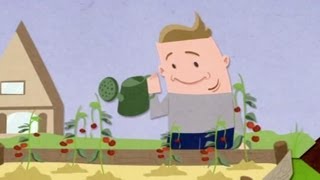(单词翻译:单击)
We talk about inventions and innovation as though the best things out there are the Internet, iPads, or smart phones.
当我们谈到发明和创新的时候,好像世上最棒的发明就是网络、iPad或是智能手机。
Or perhaps more simply, trains, planes, and automobiles.
或者更基础地,火车、飞机和汽车。
Which one is most important, the best, or the greatest?
哪个最重要、最棒、最伟大?
Which one has had the most impact on society?
哪个对社会影响最深?
Today the debate would probably be in favor of computer technology, but is it?
在现代,答案可能是计算机科技。但真的是这样吗?
Well, some would say, "Nope, not really, it's farming."
有些人会说:“错,答案是农耕”。
Where would we be if we didn't have it? Give up?
如果没有农耕,我们现在会在哪个阶段?不知道吗?
We would still be hunting and gathering with little time to invent anything, let alone the Internet.
我们现在还会在打猎和采集食物,没有时间发明任何东西,更别说发明网络。
That's right, farming is the seed of civilization.
没错,所以农耕是文明的起源。
Not quite literally, but without early man's discovery of using seeds to grow grain, we wouldn't have much of anything we have today.
也不完全是,但如果前人没有发现用种子可以种谷物,现在很多东西就不可能存在。
Growing your own food changed everything.
自己种食物改变了一切。
Sure, hunting and gathering worked just fine for tens of thousands of years, but you couldn't do much else - no time.
当然,过去几万年来打猎、采集的生活也很不错,但是你不能做其他事情,因为没有时间。
But when hunters and gatherers started planting seeds, they began to farm.
当猎人和采集食物的人开始播种种子,他们就开始农耕了。
With farming came animals, and with animals came settling down and staying in one location.
农耕之后是畜牧,畜牧之后就安顿下来,在一个地方定居生活。
So, how does this have anything to do with invention and innovation? Everything.
那么,这跟发明及创新到底有什么关系?关系可大了。
Anyone who's ever farmed, even if it's planting a half dozen tomato plants in your backyard,
任何种过菜的人都知道,就算只是在后院种6株西红柿,
knows that you usually harvest way more than you could possibly eat, a surplus.
通常收成的量都多到自己吃不完,就会剩下一些。

Farming yielded plenty of food, with enough to store, trade, and eat.
农耕生产大量的食物,多到足以储存、买卖、还有食用。
In other words, not everyone needed to be farmers.
也就是说,不需要人人当农夫。
Therefore, this allowed other people, non-farmers, to do other things such as make tools, craft pottery, and build homes.
因此,不用耕作的人就可以做其他事情,例如制造工具、制作陶器,还有盖房子。
Farming and food surpluses led to the division of labor.
农耕加上多余的食物带来了分工。
This is still thousands of years ago, so life wasn't easy.
这还是几千年前,生活并不好过。
But with so many people contributing to the community, small villages began to develop.
但因为众人的分工合作,村落开始发展起来。
As the population of villages expanded, so did the needs of the people. Things got complicated.
随着村落人口的增加,人的需求也变多。情况变得更为复杂了。
But, civilization is just that - advanced, complex societies.
不过文明发展就是这样--先进的、复杂的社会。
And without farming, they would not exist.
没有农耕,这些就不会存在。
Villages increased in size, eventually becoming the first cities.
村落开始扩张,最后发展为第一座城市。
Cities are just one of the basic features of a civilization,
城市只是文明发展的一项特点,
the others include central government, system of writing, organized religion, art and architecture,
其他特点还有中央政府、文字系统、有组织的宗教、艺术和建筑,
urban planning of roads, bridges, and public works, social classes, and different jobs.
道路、桥梁、公共建设的规划,社会阶级,还有各种工作。
Developing expertise in various types of occupations allowed for innovative ways of doing things,
各领域发展出各自的专业,用创新的方式做事情,
producing new products, or making advancements in technology.
生产新产品或是改进技术。
As civilizations became more complex, new ways of doing things were needed.
随着文明变得更加复杂,就需要新的生活方式。
Some were out of necessity. Others because people had ideas.
有一些出于需要。其他一些来自人们的想法。
The sharing of ideas and technology led to the growth of things we readily use today, like the Internet.
想法和技术的分享造就了我们现在天天使用的东西,例如因特网。
So without farming, we'd still be hunting and gathering.
所以,没有农耕,我们现在还得打猎、采集。
No video, no computers, and certainly no world wide web.
没影片可看,没计算机可用,当然也不能上网了。


